

Patient Centered Medicine. Patient and Family-Centred Care toolkit. Bringing together patients and staff to transform health care In the aftermath of the Francis Inquiry there emerged a national focus on ‘putting patients at the centre of decision-making’.
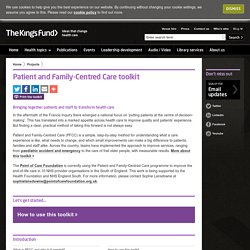
This has translated into a marked appetite across health care to improve quality and patients’ experience. But finding a clear, practical method of taking this forward is not always easy. Patient and Family-Centred Care (PFCC) is a simple, step-by-step method for understanding what a care experience is like, what needs to change, and which small improvements can make a big difference to patients, families and staff alike. Across the country, teams have implemented the approach to improve services, ranging from paediatric accident and emergency to the care of frail older people, with measurable results. Peter MacCallum Cancer Centre.
Experientia discussing ethnography and patient-centricity at EPIC 2016 - Putting people first. This week Experientia joins our colleagues and peers in Minneapolis at EPIC 2016, the premier international gathering on ethnography and design in industry.
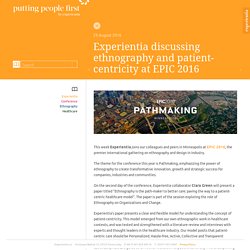
The theme for the conference this year is Pathmaking, emphasizing the power of ethnography to create transformative innovation, growth and strategic success for companies, industries and communities. On the second day of the conference, Experientia collaborator Ciara Green will present a paper titled “Ethnography is the path-maker to better care: paving the way to a patient-centric healthcare model”. The paper is part of the session exploring the role of Ethnography on Organizations and Change. Experientia’s paper presents a clear and flexible model for understanding the concept of patient-centricity.
This model emerged from our own ethnographic work in healthcare contexts, and was tested and strengthened with a literature review and interviews with experts and thought leaders in the healthcare industry. Be the first to share. Empathy: Exploring the Human Connection (Video) - Health Essentials from Cleveland Clinic. What if thought bubbles appeared above everyone’s heads so you could read their thoughts and feelings as you walked by?
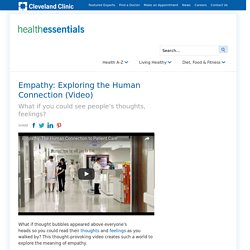
This thought-provoking video creates such a world to explore the meaning of empathy. Empathy takes on a new dimension in the hospital, where care is given and received every day. Amid the push and pull of health and sickness, empathy connects us to one other. Empathy is our watchword. It’s how we view each patient who comes through our doors. Cleveland Clinic Empathy Video - Patient Experience Advisory Group. How a tear-jerking Cleveland Clinic video went viral by accident - MedCity News. Interestingly, the Cleveland Clinic’s empathy video that was passed around healthcare circles on social media this spring and summer wasn’t actually meant for consumers’ eyes.

According to the health system’s senior director of multi-channel content, Scott Linabarger, and manager of digital engagement, Amanda Todorovich, the video was created to encourage its 40,000+ employees to be more empathetic. But when the health system’s CEO, Dr. Toby Cosgrove, showed the video at a State of the Clinic address and at Datapalooza this year, attendees began talking about and sharing the video on Twitter. The content marketing gurus saw an opportunity to use that chatter to capture readers who might be interested in other content on HealthHub, the website where the Clinic shares informative content created by physicians, staff and other sources every day.
So they created a post on HealthHub to house the video and explain the idea behind it. Empathy. Cleveland Clinic's Empathy Series Continues. Say This, Not That: Patient Experience Video. Austin Health Quality Account 2016. CE Plan FINAL. CE Plan FINAL. Untitled. Untitled. Untitled. Examining how personalised care planning can help patients with long term conditions. Authors Tracy Morton is senior policy manager in the long-term conditions strategy team, commissioning and system management directorate; Maureen Morgan, MBA, RHV, RN, is nursing officer for policy and practice and part of the chief nursing officer’s professional leadership team; both at Department of Health.

Abstract Morton, T., Morgan, M. (2009) Examining how personalised care planning can help patients with long-term conditions. Nursing Times; 105: 37, early online publication. This is the first article in a three-part series on personalised care planning for people with long-term conditions. Patient-centred quality cancer health care - Cancer Institute NSW. Published 1 December 2016 Nurse talking with patient in corridor.
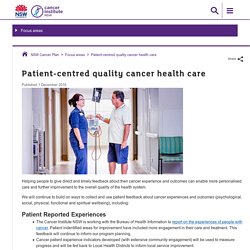
Helping people to give direct and timely feedback about their cancer experience and outcomes can enable more personalised care and further improvement to the overall quality of the health system. We will continue to build on ways to collect and use patient feedback about cancer experiences and outcomes (psychological, social, physical, functional and spiritual wellbeing), including: Patient Reported Experiences The Cancer Institute NSW is working with the Bureau of Health Information to report on the experiences of people with cancer. Professor David Currow: Building a patient-centred quality cancer system. Patient Perspectives: How do outpatient cancer clinics perform? - Cancer Institute NSW. 20 Jul 2016 Source: Patient Perspectives: How do outpatient cancer clinics perform?
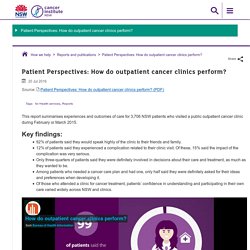
(PDF) This report summarises experiences and outcomes of care for 3,706 NSW patients who visited a public outpatient cancer clinic during February or March 2015. Key findings: 92% of patients said they would speak highly of the clinic to their friends and family. 12% of patients said they experienced a complication related to their clinic visit. Of these, 15% said the impact of the complication was very serious. The report is based on information collected using a specifically-designed questionnaire that was sent to 6,467 patients (response rate of 57%).
Foreword The incidence of cancer in NSW is widely known – the lifetime risk of being diagnosed with cancer by age 85 is one in two for males and one in three for females. Patients are primary participants in, and witnesses of, the care they receive. Books and articles on person-centred care - GPCC - Centre for Person-Centred Care, University of Gothenburg, Sweden.
GPCC filmed material - GPCC - Centre for Person-Centred Care, University of Gothenburg, Sweden. External links - GPCC - Centre for Person-Centred Care, University of Gothenburg, Sweden. Person-Centred Care Guideline - CCO. The Person-Centred Care (PCC) Program in collaboration with the Program in Evidence-Based Care (PEBC) has developed a Person-Centred Care Guideline to set the standard of care that people experiencing cancer (i.e., patients, family members, and carers) in Ontario should expect to receive.
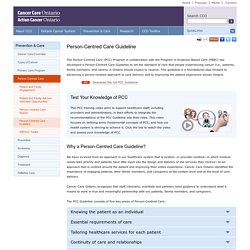
This guideline is a foundational step forward to advancing a person-centred approach to care delivery and to improving the patient experience across Ontario. Download the full PCC Guideline Test Your Knowledge of PCC This PCC training video aims to support healthcare staff, including providers and administrators, in their efforts to integrate the recommendations of the PCC Guideline into their roles. Learning Wales.